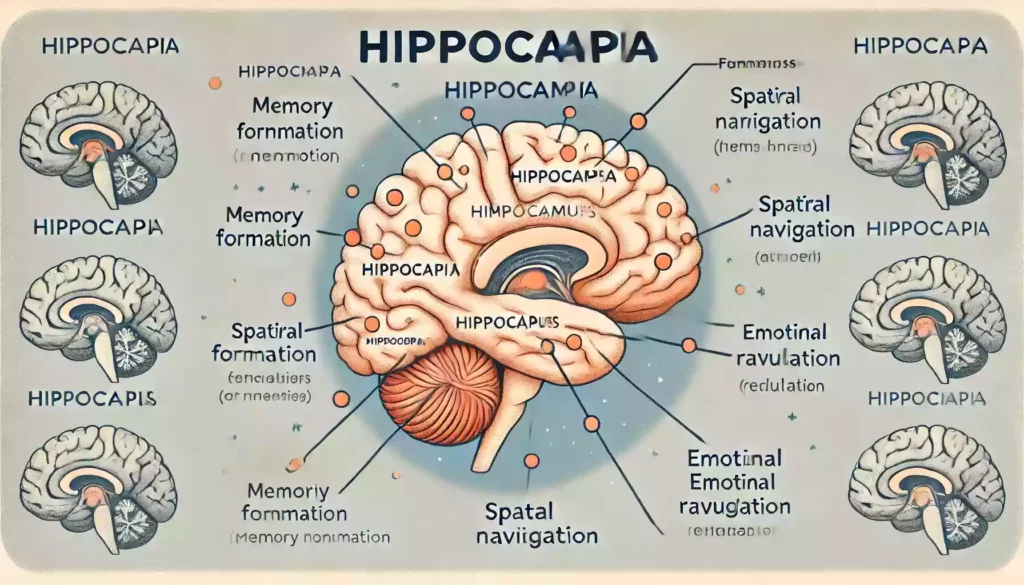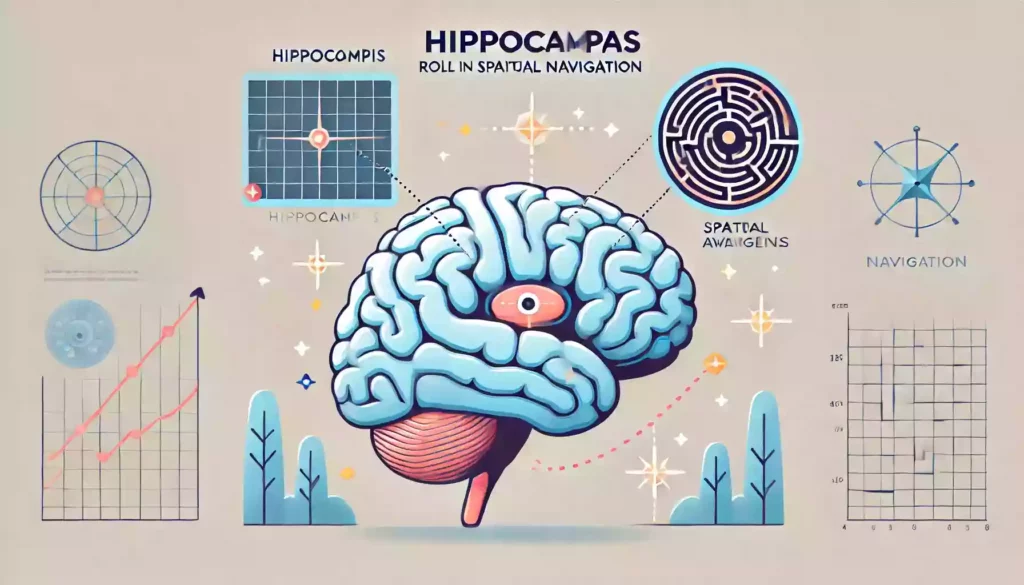Key Takeaways:
- Hippocampus crucial for memory
- Essential in spatial navigation
- Impacts emotional regulation
- Affected by various conditions
- Improvement through healthy habits
Introduction to the Hippocampus
The hippocampus is a small, yet incredibly important part of your brain. Nestled within the temporal lobe, it plays a crucial role in how you form and recall memories. This article delves into the many functions of the hippocampus, exploring how it impacts not just your memory but also your ability to navigate and manage emotions.
Understanding the hippocampus is essential for anyone interested in brain health. By learning about this vital brain structure, you can gain insights into how your mind works and how to keep it functioning at its best. Let's embark on this journey to uncover the mysteries of the hippocampus.
Anatomy of the Hippocampus
The hippocampus is shaped like a seahorse, which is fitting given its name is derived from the Greek word for seahorse. Located in the medial temporal lobe, it is part of the limbic system, a network of structures involved in emotion, behavior, and long-term memory.
This region of the brain is divided into two halves, one on each side of the brain, each working together to process information. The hippocampus is surrounded by the parahippocampal gyrus and the dentate gyrus, which also play roles in memory formation and retrieval.
In addition to its shape and location, the hippocampus is composed of several layers of neurons. These layers work in unison to encode and consolidate new memories, a process critical for learning and adaptation. The unique structure of the hippocampus allows it to perform these complex tasks efficiently.
Key Functions of the Hippocampus

The hippocampus is vital for several key functions in your brain. Its most well-known role is in the formation and retrieval of memories. Without a functioning hippocampus, you would struggle to create new memories or recall past experiences.
Another crucial function of the hippocampus is spatial navigation. It helps you understand and remember the layout of your environment, allowing you to navigate through space effectively. This is why you can find your way home or navigate a new city after only a few visits.
Additionally, the hippocampus plays a role in emotional regulation. It interacts with other parts of the brain, like the amygdala, to help process and control your emotional responses. This interaction is essential for managing stress and anxiety.
Hippocampus and Memory Formation
Memory formation is perhaps the most celebrated function of the hippocampus. It acts as a sort of librarian for your brain, cataloging and storing new information. When you learn something new, the hippocampus is hard at work, encoding these memories so you can access them later.
This process involves several stages: encoding, storage, and retrieval. Encoding happens when you first learn or experience something. The hippocampus then helps to store this information in your brain's long-term memory. Finally, retrieval allows you to recall the information when needed.
Interestingly, the hippocampus is also involved in what's called memory consolidation. This is the process by which short-term memories are transformed into long-term ones. Studies have shown that sleep, particularly deep sleep, is crucial for this consolidation process, emphasizing the importance of a good night's rest for memory retention.
Renowned neuroscientist Eric Kandel, in his book "In Search of Memory," highlights the intricate role of the hippocampus in memory formation: "The hippocampus is central to the acquisition of new memories, making it a focal point for understanding how our experiences are recorded and remembered." This underscores the hippocampus's pivotal role in how you learn and remember.
Role in Spatial Navigation

Your ability to navigate the world around you is heavily influenced by the hippocampus. This small but mighty part of your brain creates cognitive maps, which help you understand and remember spatial environments. Whether you're finding your way through a new city or simply navigating your home, the hippocampus is at work.
The hippocampus does more than just help you get from point A to point B. It allows you to remember where objects are located, understand spatial relationships, and even plan routes. This function is particularly important for survival, as it helps you locate food, avoid danger, and remember safe paths.
Studies have shown that damage to the hippocampus can severely impair spatial memory and navigation skills. For example, individuals with hippocampal damage may struggle to find their way in familiar environments or remember where they've placed items. This highlights the hippocampus's critical role in everyday life.
Impact on Emotional Regulation
The hippocampus also plays a significant role in emotional regulation. It works closely with the amygdala, another part of the brain involved in emotions, to process and manage emotional responses. This collaboration is essential for maintaining emotional balance and handling stress.
When you experience stress, the hippocampus helps regulate the release of stress hormones like cortisol. By managing these hormonal responses, it helps you stay calm and composed in challenging situations. Chronic stress, however, can damage the hippocampus, leading to difficulties in emotional regulation.
In "The Emotional Brain," neuroscientist Joseph LeDoux explains, "The hippocampus is essential for the contextualization of emotion. It allows us to remember the emotional significance of events, which is crucial for learning and adaptation." This insight emphasizes the hippocampus's role in not just memory, but also how we emotionally respond to our experiences.
A healthy hippocampus contributes to a balanced emotional life, helping you navigate both the physical and emotional landscapes of your world.
Hippocampus and Learning
The hippocampus is fundamentally linked to your ability to learn. It acts as a gateway, converting short-term memories into long-term storage. This process is crucial for absorbing new information and building knowledge over time.
When you learn something new, such as a skill or a fact, the hippocampus is activated to process this information. It then integrates this new knowledge with existing memories, helping to create a coherent understanding of the world around you.
One fascinating aspect of the hippocampus's role in learning is its involvement in neuroplasticity. Neuroplasticity refers to the brain's ability to change and adapt as a result of experience. The hippocampus supports this adaptability by forming new neural connections, which are essential for learning and memory.
Research has shown that stimulating the hippocampus through activities like reading, puzzles, and physical exercise can enhance learning and memory capabilities. This underscores the importance of keeping the hippocampus engaged and healthy through continuous mental and physical activity.
Conditions Affecting the Hippocampus
Several conditions can affect the hippocampus, impacting its ability to function properly. These conditions can lead to memory issues, difficulties with navigation, and problems with emotional regulation.
One of the most well-known conditions affecting the hippocampus is Alzheimer's disease. This neurodegenerative disorder leads to the gradual loss of hippocampal neurons, resulting in severe memory impairment and disorientation. Early symptoms often include difficulty remembering recent events and getting lost in familiar places.
Stress and depression can also negatively impact the hippocampus. Chronic stress leads to the release of excessive cortisol, which can damage hippocampal cells. Similarly, depression has been associated with reduced hippocampal volume, which may explain some of the memory and cognitive issues observed in depressive disorders.
Traumatic brain injury (TBI) is another condition that can harm the hippocampus. TBIs can result from accidents or blows to the head and often lead to memory loss and difficulties with spatial navigation.
Furthermore, epilepsy can affect the hippocampus, particularly in cases of temporal lobe epilepsy. Seizures originating in or involving the hippocampus can lead to memory problems and other cognitive deficits.
Understanding these conditions highlights the importance of protecting and supporting hippocampal health through lifestyle choices and medical interventions when necessary.
Improving Hippocampal Health
Maintaining a healthy hippocampus is vital for your overall brain function. There are several ways you can support and enhance hippocampal health through lifestyle choices and daily habits.
One of the most effective methods is regular physical exercise. Exercise increases blood flow to the brain and stimulates the growth of new neurons in the hippocampus. Activities like aerobic exercises, such as running or swimming, are particularly beneficial.
Mental stimulation is equally important. Engaging in activities that challenge your brain, like puzzles, reading, and learning new skills, can enhance neuroplasticity. This continuous mental engagement helps to keep your hippocampus active and healthy.
Diet also plays a crucial role in brain health. Consuming a balanced diet rich in antioxidants, omega-3 fatty acids, and other brain-boosting nutrients can support hippocampal function. Foods like blueberries, fatty fish, and nuts are excellent choices for promoting brain health.
Quality sleep is another essential factor. During sleep, particularly during the deep sleep stages, the brain consolidates memories and processes new information. Ensuring you get enough restful sleep each night can significantly impact your hippocampal health and overall cognitive function.
Managing stress is crucial for protecting the hippocampus. Practices like mindfulness, meditation, and yoga can help reduce stress levels and prevent the damaging effects of chronic stress on the brain.
Finally, maintaining social connections and a positive emotional environment can benefit your brain health. Social interactions stimulate cognitive functions and can have a protective effect against age-related cognitive decline.
Recommended Resources
- In Search of Memory by Eric Kandel
- The Emotional Brain by Joseph LeDoux
- Brain Rules by John Medina

.thumb.jpg.707652b1f845175b2f35e03ba7f1673e.jpg)


Recommended Comments
There are no comments to display.
Create an account or sign in to comment
You need to be a member in order to leave a comment
Create an account
Sign up for a new account in our community. It's easy!
Register a new accountSign in
Already have an account? Sign in here.
Sign In Now